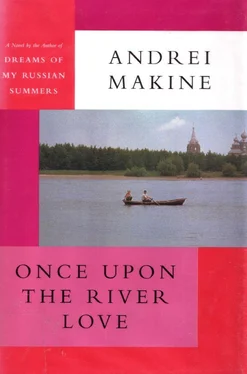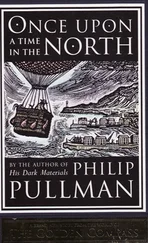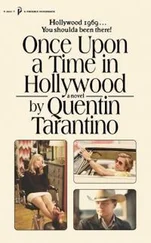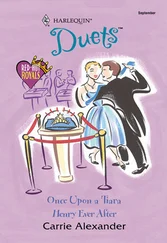The coziness of this shanty had the ephemeral quality about it that you always find in dwellings where you are not really at home.
A narrow iron bed. A table covered with a waxed cloth on which the pattern had long since faded. A cast-iron stove. A few postcards fixed above the bed in the manner of an iconostasis.
The most important object in this small room was a round clock. The front, where the hands were, had come to take on the look of a human physiognomy. On this familiar face we read all the timetables and the delays, linking each hour and each train with a different expression. In this mimicry there was one evocation that I particularly enjoyed on the occasions when I came to spend the evening with my aunt.
This was the moment of dusk. The sun had completed its low course in the winter sky, grazing the dark tips of the pine trees. It was now asleep at the far end of the tracks, in the direction of the city, to the west. I went out and saw the double Une of the rails, shining under the hoarfrost and tinted with pink rays. The fog was growing thicker. The mauve light above the snowy tracks was vanishing.
I went into the izba, I heard the gentle hissing of the great kettle on the stove, I saw my aunt preparing supper: a few potatoes, some frozen bacon that she had just removed from a lean-to attached to the izba – our fridge – some tea, and some poppy-seed biscuits… Outside the little window, which was garlanded with arabesques of ice, the blue slowly changed to purple, then to black.
With our last cup of tea we began glancing at the clock face. We already sensed its coming, that train, as it wound its way along, somewhere in the depths of the sleeping taiga.
We went out well in advance. And in the silence of the evening we heard it approaching. First of all a distant murmur that seemed to arise from the depths of the earth. Then the dull sound of a cap of snow falling from the summit of a pine tree. Finally a drumming, more and more resonant, more and more insistent.
When it appeared I had eyes only for the luminous carnival of the coaches. And the locomotive – a real old-fashioned one – with enormous wheels painted red and glittering connecting rods. It looked like a dark monster covered in flakes of hoarfrost. And, on its breastplate, a broad red star! This nocturnal meteor emitted a fierce roar and made us step back several paces with its powerful draft. My aunt flashed her lantern, and I opened my eyes very wide.
The snug comfort that I guessed at behind the brightly Ht windows fascinated me. What mysterious beings did that comfort shelter? From time to time I managed to focus on a female silhouette, a couple seated at a little table with two glasses of tea. Occasionally even a shadowy figure reclining on her berth. But such snatched sightings were very rare. Thick hoarfrost or a drawn curtain would make my observation impossible. And yet a glimpsed silhouette was more than enough for me…
I knew that within the train there was one special coach, bearing inscriptions in three languages: Wagon-lit – Schlafwagen – Vagoni-letti. It was in these coaches that the extraterrestrials, which is what people from the Western World were to us, crossed the empire.
I imagined a woman who had been in her compartment for a day already and was going to spend a whole week there! Mentally I pieced together her long journey: Lake Baikal, the Urals, the Volga, Moscow… How I longed to be at the side of this unknown traveler! To be within, in the warm and narrow confines of the compartment where you sit so close together that every movement, every look, takes on an erotic significance, especially with the approach of night. And the night itself, with the rhythmic swaying of the car, is long, so long…
But already the snow squall provoked by the passage of this fabulous train was calming down, and all one could see in the cold fog down the track was two red lights fading from view…
I went again to see my aunt in the switch operator s izba one gray afternoon in February. On the path through the taiga I had noticed a strange languor abroad in the air. The blue distance was misty, but this mist did not glitter like the fog of the great frosts. It clouded over the brilliance of the snows, softened outlines. The taiga no longer seemed like a block of ice streaked with the black lines of the pine trees. Not at all. Every tree was alive, awaiting a sign, already recovering from the long immobility of winter.
On the branches of the pine tree that touched the roof of the little house I saw two crows. As they uttered their guttural cries, they seemed to be conversing. And in these cries one could also hear a soft, languorous weariness. Their voices no longer barked out, as in the deep heart of winter, but floated in the pleasantly mild air, occasionally summoning up a lazy echo.
"We're going to have one of those mild spells!" my aunt said to me when I appeared at the door. "And then if it starts to snow it certainly won't stop tonight…"
The misty languor in nature that day was strangely close to me. For several weeks now I had felt within myself- more in my heart than in my head – a bizarre uneasiness. Its presence was so new to me that I experienced it very physically, I could almost touch it, like the box of matches in my pocket. But the reason for it escaped me.
It sometimes seemed to me that it had all begun that evening at the bathhouse when Samurai spoke of the beauty of the female body, which, according to him, made time stand still. From then on, the smell of his cigar gave me the feeling of a singular nostalgia. One of the most terrible kind: for places and faces one has never seen. Which one mourns as being lost forever. Young savage that I was, I could not know that this was simply love that had not yet found its object. This gave it a violent but blind intensity. For instance, just now I had almost started running after the crows as they flew away slowly, hoping to lose myself in the lascivious idleness of their guttural calls. I felt that nature was already instinctively preparing for its amorous rite of spring. I yearned to be a part of it by surrendering entirely… But to whom?
I was angry with Samurai for having talked about all these weighty things – love, life, death – in a way that was incomprehensible to me, rhetorical, bookish. I was used to perceiving life very concretely. Love – and I saw the graceful curve of the beautiful stranger's body beyond the wood fire. Life – and I saw the living procession of faces that gravitated around the three poles of our universe: taiga, gold, camp. Death – a truck sinking slowly beneath the ice in a long hole at that accursed place the Devil's Bend. And also the wolf, large and handsome, that some loggers had killed and then flung down from their tractor near Verbin's izba, calling out to him: "Here! Make yourself a new shapka, grandpa!" The wolf was already rigid, its paws hard, inert. And at the corner of its proud eye there was a great frozen tear…
I wanted to continue experiencing life in only that way, in all its joy and all its sorrow, immediate, unthinking. Samurai, with his unanswered questions, had made me uneasy.
Waiting for the night train seemed to me stupid. Yes, waiting for this famous Transsiberian, with wide eyes and a thumping heart, to catch a glimpse of a shadowy figure who did not even have an inkling of my existence – what stupidity! And how many of these female silhouettes had there been already, whom I had fallen in love with and accompanied on their journey across the empire? Without knowing if beside my beautiful strangers their husbands were snoring peacefully?
I felt disillusioned, duped, almost betrayed by my night-walking woman of the West.
Outside in the gray air swirled the great fluffy snowflakes that everything had predicted. The view above the track was woven with their white filaments.
Читать дальше












